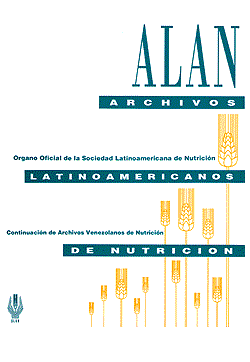Effect of sprouting on the nutritional characteristics, bioactive and functional properties of basul (Erythrina edulis)
DOI:
https://doi.org/10.37527/2021.71.4.001Keywords:
Basul, Germinado, Digestibilidad in Vitro, Compuestos Fenólicos, Capacidad Antioxidante, Germinated, In Vitro Digestibility, Phenolic Compounds, Antioxidant CapacityAbstract
Introduction. Basul is the fruit of the Erythrina edulis plant. It has a high content of proteins, dietary fiber, and antioxidants, but it also contains antinutrients. Objective. The study objective was to evaluate the effect of sprouting on the nutritional characteristics, bioactive and functional properties of basul seeds. Materials and methods. Basul seeds were germinated to produce flour (HBG) and determine its proximal composition and in vitro digestibility of the protein through a randomized design with a 2x2x2 factorial arrangement (soaking time, germination time, and presence or absence of light). Total phenols (CFT), antioxidant capacity (ABTS and DPPH methods), and hydration and oil adsorption properties were also determined. Results. The different germination conditions did not modify the proximal composition of HBG. However, the in vitro digestibility of the protein increased up to 6.25% in one of the treatments compared to the non-germinated sample. The CFT also increased from 241.49 mg AGE/100g (without germination) to 267.15 mg AGE/100g (germinated) and the antioxidant capacity (ABTS) from 173.04 μmolTE/g (without germination) to 195.67 μmolTE/g (germinated). Solubility, water absorption capacity, and swelling capacity also increased. Conclusion. The quality of the protein, the content of total phenols, the antioxidant capacity, and the functional properties of interaction with the water of the basul seed improved with germination.
Downloads
Published
How to Cite
Issue
Section
License
Copyright (c) 2022 Fulgencio Vilcanqui-Pérez, Guadalupe Chaquilla-Quilca, Víctor Hugo Sarmiento Casavilca, Candy Naya Céspedes Orosco, Yeni Ventura Saldívar, Paola Cortés-Avendaño

This work is licensed under a Creative Commons Attribution-NonCommercial 4.0 International License.
Usted es libre de:
Compartir — copiar y redistribuir el material en cualquier medio o formato
Adaptar — remezclar, transformar y construir a partir del material
La licenciante no puede revocar estas libertades en tanto usted siga los términos de la licencia
Bajo los siguientes términos:
Atribución — Usted debe dar crédito de manera adecuada, brindar un enlace a la licencia, e indicar si se han realizado cambios. Puede hacerlo en cualquier forma razonable, pero no de forma tal que sugiera que usted o su uso tienen el apoyo de la licenciante.
NoComercial — Usted no puede hacer uso del material con propósitos comerciales.
No hay restricciones adicionales — No puede aplicar términos legales ni medidas tecnológicas que restrinjan legalmente a otras a hacer cualquier uso permitido por la licencia.




